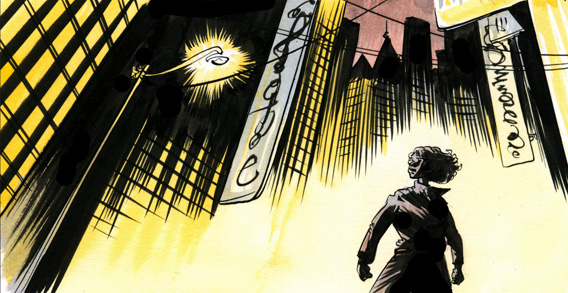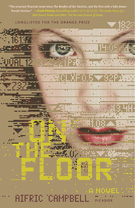
Slate is an Amazon affiliate and may receive a commission from purchases you make through our links.
A Skirt Amongst Men
Aifric Campbell’s caustic novel follows a young Irishwoman’s rise in the world of high finance.

Illustration by Nate Powell
One day in the autumn of 2011, working in the library of Trinity College, Dublin, I saw a notice for a careers talk by a team from the investment bank Morgan Stanley. At the time I was researching a novel set in a bank, and desperate for any chance to put a human slant on the byzantine world my investigations had thus far uncovered, I decided to go along. When I went to the seminar room, though, a flustered-looking aide told me that due to a turnout overwhelmingly beyond expectations, the talk had been relocated to the Edmund Burke, the largest lecture theatre on campus. I hurried downstairs and got one of the last remaining seats. Around me, students perched on the steps or crowded the back.
Even the bankers seemed surprised. This was 2011, after all. In Madrid, Athens, New York, and London, young people were demonstrating on the streets against the iniquities of the banks. Here in Ireland, the collapse of the banking system had been described as the worst disaster since the Great Famine. Tens of thousands had lost their jobs and now lived in the shadow of eviction, soup kitchens were overwhelmed by people who a few months before would have called themselves middle-class, and every day some new detail emerged of the corruption and incompetence of the banks who had brought all this about—the worst of which, Anglo-Irish, had as it happened employed Morgan Stanley to put a gloss of legality on its final attempts to cover its losses. Yet for these kids a job in a London bank was an opportunity too good to be passed up. Was this generation really so depoliticized that they no longer recognized right and wrong? Or was this the resumption of a much older and distinctly Irish story? Had the jobs lost due to the banking crash given them just the excuse they needed to go?
Aifric Campbell worked on the trading floor of Morgan Stanley for 13 years, and On the Floor, her smart, caustic, moving novel, follows a young Irishwoman, Geri Molloy, as she tries to make it in a London investment bank. Success requires she sever all ties with home, but this isn't something she feels particularly bad about. On the contrary, it's coming back that's the problem: She describes waiting in Heathrow Airport on Christmas Eve with her fellow escapees—“vets in Canada, doctors in Ethiopia, barmen in Boston, nurses in New York” and other “scattered children of Eire,” for whom Ireland is nothing more than a “transit lounge” they pass through once a year in order to be reminded of all the reasons that they left. The book is set in 1991, on the eve of the first Gulf War, but the forces motivating Geri and her generation are the same ones that James Joyce—Campbell's compatriot and like her a former bank employee—identified almost a century before: the paralysis and corruption of small-town life, and the betrayal that awaits anyone unwilling to accept it. Unfortunately for Geri, betrayal isn't confined to the shores of Ireland, although in London it's significantly better paid.
Banking is notoriously difficult to dramatize, and often stories set in banks drop the numerical stuff early on for something that readers, and for that matter writers, can more readily understand. But Campbell knows this world inside out, and joining Geri at the start of her working day (at an eye-watering 6:38 a.m.) we are plunged directly into a fizzing ocean of banking arcana. We overhear incomprehensible but expensive conversations about Japanese warrants and convertible bonds. We meet Geri's colleagues—her boss, splendidly named “the Grope”; Rob, a bookie's son who never went to college and now has the most profitable trading book in the firm; and the intriguing Pie Man, a compulsively eating quant who represents, in an industry not hitherto noted for the human touch, the algorithmic, even more dehumanized future. Geri aside, they are an unsympathetic lot. They don't have time for character attributes other than greed and are totally immune to satire. This leads to some funny moments: We hear how “the gloom over Black Monday” was lifted by the release of Oliver Stone's Wall Street, which reconfirms for these traders “that greed is good and lunch is for wimps. The traders were flying in truckloads of Brooks Brothers' button-downs, dragging their girlfriends along to see how cool their jobs looked on a big screen, some even gekkoed their hair.” They also read The Bonfire of the Vanities in which, they believe, “the trading floor was elevated to an art form...there it was in black and white: we were Masters of the Universe.”
Shrewd as her account is, Campbell's real achievement here is her heroine's voice. Spirited, sardonic, wounded, funny, Geri remains compelling no matter how esoteric the material she's discussing, or how annoying and punchable the guy she's discussing it with. And they are almost all guys; Geri is well aware of her precarious role as “the skirt amongst men.” The only other woman around is Zanna, an independently wealthy “Europhile Yank” who plots her route through the glass ceiling from the “nerve centre” of her enormous wardrobe, and with Geri draws up a Rule Book for Wannabe Female Bankers on a napkin: Never get period pains in the office; never cry in the office; and, chillingly, “Always remember that two women standing together on a trading floor can only be gossiping; therefore treat all female colleagues with total contempt.” However, Geri has an ally, of sorts. Felix Mann, a reclusive hedge fund manager and “the smartest guy on the planet,” has chosen Geri to handle all of his trades. From his business alone, she pulls in millions for the bank, and is therefore untouchable, although she's aware that her boss and everyone else assume that she and Felix are sleeping together.

This Felix Mann—more on that portentous nomenclature below—is, to put it mildly, an odd fish. A Cambridge philosophy graduate who holes up in a tower in Hong Kong with a collection of creepy war memorabilia, he speaks in the baroque, contraction-averse tones of the polymath movie serial killer or Nazi. ('“Transubstantiation, Geraldine. A rather troubling concept for an Irish Catholic child I would have thought—eating the flesh and blood of the grown-up baby Jesus?”') Add his millions of dollars to the mix and it's very hard not to think of Christian Grey, of Fifty Shades fame, though instead of beating her with a belt, he makes her read Immanuel Kant. Felix has decided Geri would be of more use to him in Hong Kong; Geri's boss, seeing dollar signs, concurs. But Geri has recently broken up with her boyfriend, brilliant, insufferable Stephen, and can't bear the thought of leaving London.
If we hear a little too much about her heartache over Stephen, Geri’s quite a bit more reticent when it comes to what actually makes her tick. It's not until quite late in the narrative, courtesy of a rather unlikely plot twist, that we discover who she really is, and the double-betrayal that propelled her out of Ireland and into the bank. One element of this betrayal is a tragedy all too plausible to an Irish reader, though it could have been better fleshed out here. The other involves her family and school's hostile reaction to Geri's outing as a math genius, which to me seemed problematic. It's true that the Ireland of the 1980s was a deeply conservative place, with a national philosophy Campbell tartly reduces to “Don't be upsetting your mother.” But even then it had a huge regard for learning, and an education system good enough to propel young Irish people into high-paying jobs all over the world (meaning they could send their money home, but not vote—the perfect solution as far as the government of the time was concerned). So it's a little hard to credit that her parents and teachers would be so resistant to Geri's obvious gifts.

Photo courtesy of An-Sofie Kesteleyn
It must be said too that Geri does not convince as a math genius. Her sentences—long, lolloping affairs, with a tendency to pick up modifiers, qualifiers and other, unrelated subclauses like so many dazed hitchhikers packed into a speeding Pontiac—may be exactly what one might expect in a banker's voice, but from a natural mathematician the lack of precision seems dissonant.
Pie Man, the corpulent quant, is a better rendering of this type, and of the kind of sociopathic nerdery that will soon take over banking. Pie Man has a crush on Geri, and there's a terrific scene in which he squares up to Geri's old flame Rob, the unschooled, intuitive trader. Rob throws schoolyard taunts at Pie Man; Pie Man responds by painting a picture for him of his impending obsolescence. In a few years’ time, he declares, “it will all be technical trading. ... Just watch what technology is going to do to your careers. ... None of you will survive.” If only Pie Man and Rob could see 17 years into the future! In IOU, his outstanding book on the 2008 crisis, John Lanchester is scathing about the catastrophic misapplication of math to the market, and the world-historical feats of wrongness the rocket scientists produced: for instance, using the Gaussian copula formula, quants worked out that a 20 percent fall in house prices could occur only in a timeframe many trillions of years longer than the history of the universe. Of course, it happened almost immediately, and brought about the implosion of the entire global economy. One can't help but feel the novel's refusal to contemplate what's coming down the tracks—not just the 2008 crash, but S&L, Long Term Capital, the Internet bubble, etc., etc.—as a missed opportunity.
By the end of the book, following a disastrous fact-finding mission to Hong Kong in which all the facts she finds out are the wrong ones, Geri has few illusions left. “There is always someone using you,” Felix tells her succinctly. But here, again, it feels like Campbell pulls her punches. The lunacy of the whole banking project is never addressed; instead Geri simply withdraws, as though the problem all along was really that of a woman in a man's world. A passing reference to Either/Or only deepens the ambiguity. The happiest man is the one who lives in the present, Geri says, for no reason it seems at first. And then you get it: happy man—Felix Mann. Does Campbell genuinely believe that a man who spends his entire life on a computer in a darkened room in Hong Kong surrounded by pictures of atrocities can be said to be living in the present? And that he is a happy, even the happiest, man? This seems like a serious downgrade of both happiness and humanity, as well as an attitude to the machinations of hedge fund managers that seems peculiar, even from the perspective of 1991, before we knew exactly what these people were up to,
Campbell is a gifted storyteller, and possesses a rare insight into this secretive world. But maybe it's hard to take the investment bank out of the girl, because for all her authority, and for all her heroine's spirit and singularity, On the Floor leaves us with the image of banking bankers themselves are so fond of—an elite realm of coldly brilliant mavericks who ruthlessly exploit flaws in the system for huge returns—quite contrary to the industry the events of the last five years have revealed, so warped by greed, ineptitude, and herd thinking that its contribution to the real world has come to resemble a game of Russian roulette.
I suspect Aifric Campbell has a lot more to say on this topic, and I hope she comes back to it in future novels. The world of finance is so lucrative that it still casts a spell; Campbell could, if she wanted to, be the one to open the eyes of the next generation of kids before they leave the leaky lifeboat of home for the proud Titanics of Wall Street and the City.
---
On the Floor by Aifric Campbell. Picador.
See all the pieces in this month’s Slate Book Review.
Sign up for the Slate Book Review monthly newsletter.